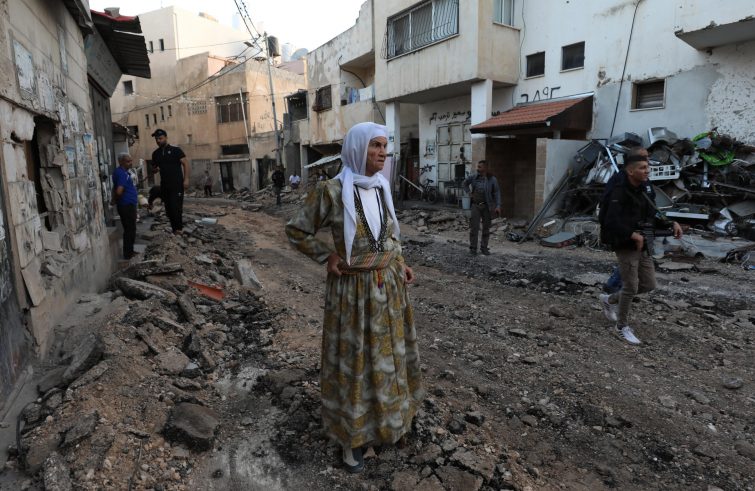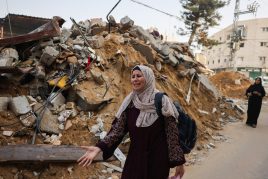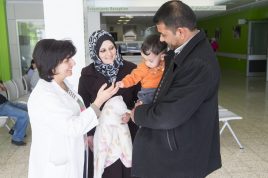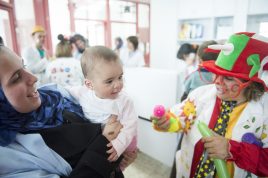
The Caritas Baby Hospital was due to celebrate the 70th anniversary of its foundation and mission on October 22, but the Hamas terrorist attack on Israel a month ago and the subsequent outbreak of what has been dubbed the ‘Sukkot War’ has caused it to be postponed. And no one knows until when. The Caritas Baby Hospital in Bethlehem (CBH), the only paediatric hospital in the West Bank providing treatment and care to infants and children up to 16 years of age, is severely affected by the conflict and tensions that have now reached critical levels in the Bethlehem area and throughout the West Bank.
West Bank: the figures of violence. The numbers speak for themselves. According to OCHA, the UN Office for Humanitarian Affairs, 150 Palestinians, including 44 children, have been killed by the Israeli military in the West Bank since October 7. Three Israelis have been killed in attacks by Palestinians. The number of Palestinians killed in the West Bank since the outbreak of the war represents more than a third of all Palestinian casualties in the West Bank in 2023 (397). Since October 7, the Israeli military has wounded 2,375 Palestinians, including at least 251 children, while there have been 218 settler attacks with over 60 injured. Nearly half of the incidents involved Israeli forces accompanying or actively supporting the settlers, whose attacks often prevent Palestinians from picking olives and thus deprive them of their livelihood. Also yesterday, 11 Palestinians were wounded in clashes with the Israeli army near Bethlehem.
Emergency care. CBH staff continue to provide health and social services despite the emergency. To date, they explain from the hospital, “the population’s first obstacle is the restriction on freedom of movement. The life of the Palestinian population in the West Bank is governed by a complex administrative system that has been unilaterally put in place by the State of Israel. In the immediate aftermath of the horrific attack carried out by Hamas and Islamic terrorism against the people of Israel
the Israeli government declared a state of war. It imposed surveillance measures on the West Bank, including the town of Bethlehem: a curfew and a ban on travelling outside one’s local authority area.
This also applies to residents of hamlets, many of which are in the Bethlehem district.” The CBH made known that “many businesses and shops, as well as schools, have been closed. These severe restrictions on movement make it very difficult, if not impossible, to reach the Caritas Baby Hospital which, with its 82 beds, intensive care unit and polyclinic, is a point of reference for families from dozens of villages in the region.”
 Settler aggression. Israeli settlers, who “have intensified their attacks against Palestinians”, are also harming the Palestinian population, sources from the children’s hospital denounced. Since October 7, settlers have killed more than 100 Palestinians, mostly in punitive actions against civilians living in the villages. Attacks are also increasing in the hamlets around Bethlehem.”
Settler aggression. Israeli settlers, who “have intensified their attacks against Palestinians”, are also harming the Palestinian population, sources from the children’s hospital denounced. Since October 7, settlers have killed more than 100 Palestinians, mostly in punitive actions against civilians living in the villages. Attacks are also increasing in the hamlets around Bethlehem.”
“This creates a widespread state of fear and anxiety that prevents people from leaving their homes, even when it comes to protecting the health of their children.
Growing poverty. In addition to the restrictions on freedom of movement, there are also economic and material difficulties. The West Bank is currently “sealed off”. Tourists and pilgrims, who provide most of the income in Bethlehem, where more than 90 per cent of jobs are in the tourism industry, left immediately after the war broke out. In addition, the CBH adds, “all transport to and from the West Bank is blocked, as is transport between towns. As a result, access to goods of all kinds, including locally produced goods, is increasingly difficult. The psychological burden of this deprivation is huge.”
 The commitment of the Caritas Baby Hospital. The doctors and staff of the Children’s Hospital (230 healthcare staff, ed.’s note) are not exempt from this serious crisis situation. They are confronted with “the difficulty of not being allowed to travel outside the municipality in which they live, and this is preventing some of them from reaching their place of work.” However, according to the CBH, the medical and nursing staff who do manage to reach their workplaces are always available to help every patient who arrives at the hospital. Admissions fluctuate, from days with high numbers to days with around 20% of normal capacity. Some children, however, are in urgent need of treatment: “Children with chronic illnesses,” the hospital says, “who require continuous and scheduled treatment, as well as those with serious clinical conditions who therefore need to be cared for with appropriate equipment and medication. In this scenario, the hospital staff have found some “effective and professional” ways of being at the children’s side despite everything. In fact, “a free 24-hour helpline has been set up for parents to contact their doctors directly about their children’s health or to get psychological support; the hospital’s social services contact all the families of children with chronic illnesses to guarantee them the medicines they need. The delivery of medicines to homes in areas outside Bethlehem is possible thanks to a network of contacts and connections that the Caritas Baby Hospital has developed over time. Hospital staff make home visits in Bethlehem and the surrounding area by ambulance and ambulance cars to visit children in need of expert medical care; stocks of medicines, medical supplies and diesel fuel have been increased so that all wards are always equipped to receive children, both for simple outpatient visits and for critical and intensive care.”
The commitment of the Caritas Baby Hospital. The doctors and staff of the Children’s Hospital (230 healthcare staff, ed.’s note) are not exempt from this serious crisis situation. They are confronted with “the difficulty of not being allowed to travel outside the municipality in which they live, and this is preventing some of them from reaching their place of work.” However, according to the CBH, the medical and nursing staff who do manage to reach their workplaces are always available to help every patient who arrives at the hospital. Admissions fluctuate, from days with high numbers to days with around 20% of normal capacity. Some children, however, are in urgent need of treatment: “Children with chronic illnesses,” the hospital says, “who require continuous and scheduled treatment, as well as those with serious clinical conditions who therefore need to be cared for with appropriate equipment and medication. In this scenario, the hospital staff have found some “effective and professional” ways of being at the children’s side despite everything. In fact, “a free 24-hour helpline has been set up for parents to contact their doctors directly about their children’s health or to get psychological support; the hospital’s social services contact all the families of children with chronic illnesses to guarantee them the medicines they need. The delivery of medicines to homes in areas outside Bethlehem is possible thanks to a network of contacts and connections that the Caritas Baby Hospital has developed over time. Hospital staff make home visits in Bethlehem and the surrounding area by ambulance and ambulance cars to visit children in need of expert medical care; stocks of medicines, medical supplies and diesel fuel have been increased so that all wards are always equipped to receive children, both for simple outpatient visits and for critical and intensive care.”
 The appeal. Perhaps the only source of hope at the moment is the solidarity of the many benefactors who continue to offer their support because, as the hospital points out, “despite everything, international bank transfers are functioning normally, as is the payment of salaries to the staff”. The CBH is therefore appealing for continued support for the institution, which is run by the Swiss association Kinderhilfe Bethlehem and financed by donations coming mainly from Switzerland, Germany, Italy, Austria and the United Kingdom. In Italy, the association Aiuto Bambini Bethlehem is actively involved in fundraising activities.
The appeal. Perhaps the only source of hope at the moment is the solidarity of the many benefactors who continue to offer their support because, as the hospital points out, “despite everything, international bank transfers are functioning normally, as is the payment of salaries to the staff”. The CBH is therefore appealing for continued support for the institution, which is run by the Swiss association Kinderhilfe Bethlehem and financed by donations coming mainly from Switzerland, Germany, Italy, Austria and the United Kingdom. In Italy, the association Aiuto Bambini Bethlehem is actively involved in fundraising activities.










